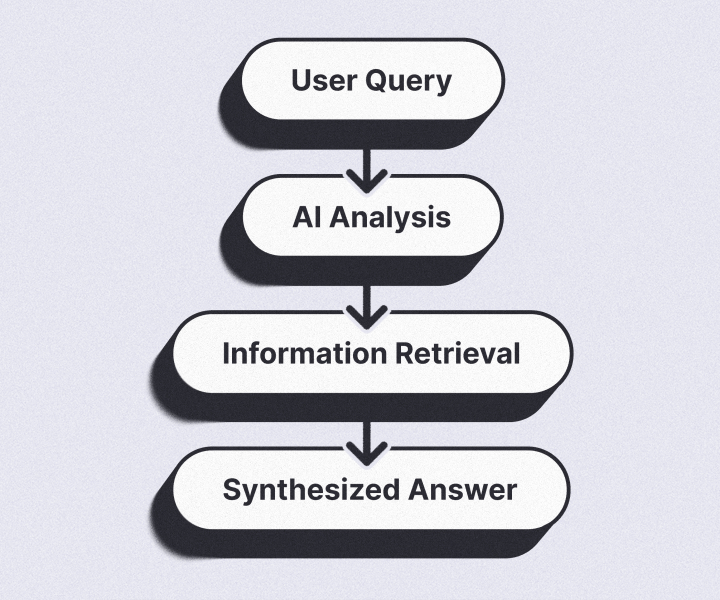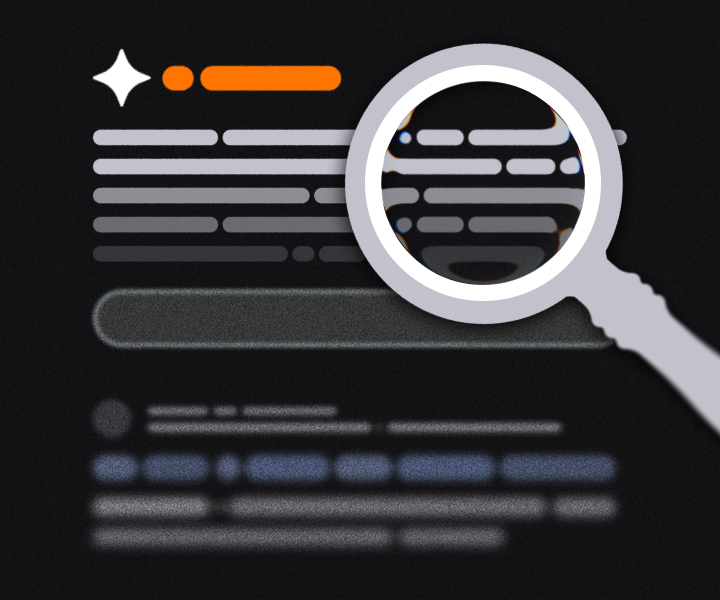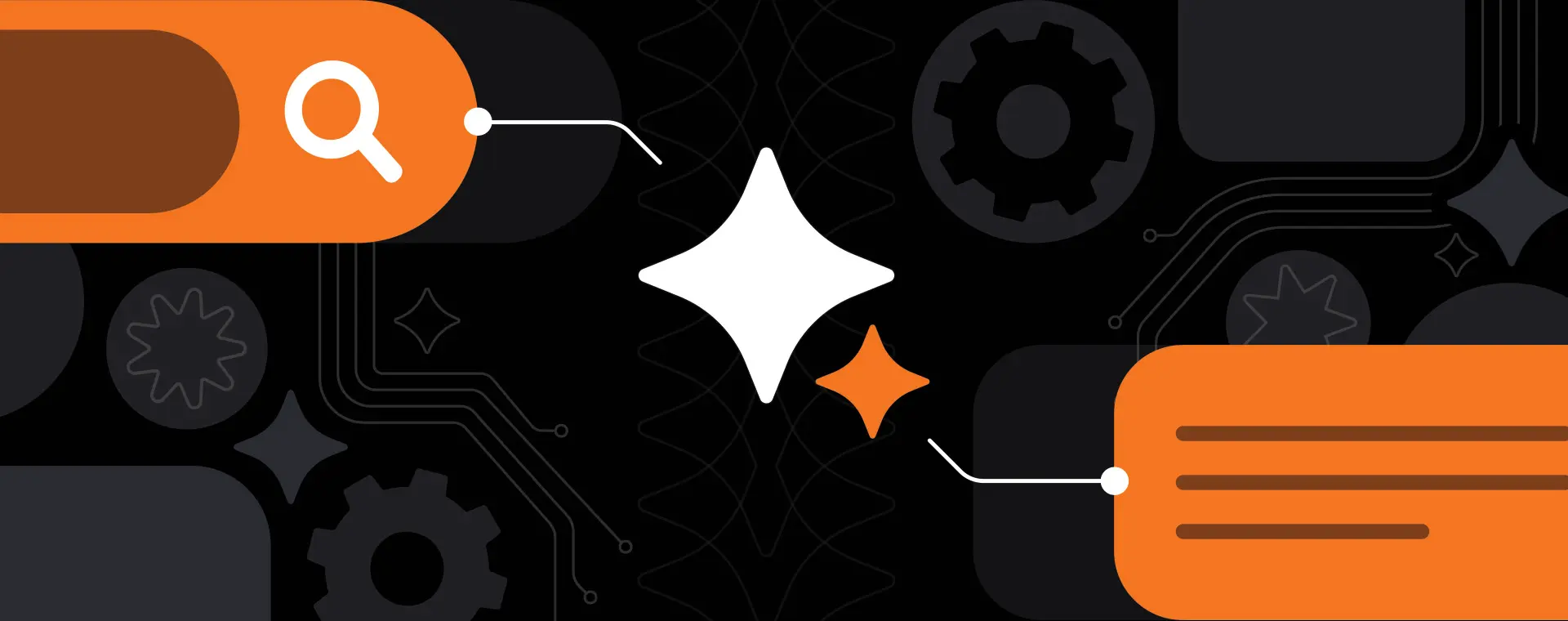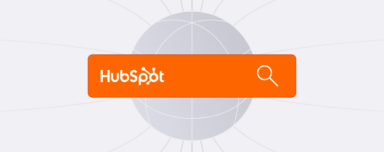AI Search Engine Optimization: How to Rank in AI Search Results 2025
With Google’s market share dropping below 90% for the first time since 2015, diversified SEO strategies to maintain visibility have become increasingly important. AI search engines, such as ChatGPT, Perplexity, Google AI Overviews, and Gemini, are reshaping how users discover information, products, and services.
These platforms don’t just list websites either; they synthesize information from multiple sources to provide direct, conversational answers that often eliminate the need to click through to your site. This article provides an analysis of the differences between traditional and AI SEO, along with actionable steps you can take to stay competitive in AI search results.
Key Takeaways
- AI search engines operate differently from traditional search, collecting information from multiple sources rather than ranking web pages by keyword relevance.
- Citation optimization has replaced click optimization as the primary goal, since AI platforms mention brands within their responses rather than driving traffic to individual websites.
- Content structure and format significantly impact AI visibility, with listicles, how-to guides, and Q&A formats receiving 35% more citations than unstructured content.
- Platform-specific strategies are essential because each AI search engine has distinct citation preferences.
How AI Search Engines Work Differently from Traditional Search
While Google and Bing evaluate web pages based on keywords and backlinks, AI search engines use a completely different approach. This approach focuses on collecting and analyzing information from multiple sources.
The Three-Stage AI Search Process
AI search engines operate through a sophisticated process that goes far beyond simple keyword matching:

1. Query Understanding and Intent Analysis
AI platforms utilize advanced natural language processing to comprehend not only what users are asking, but also what they truly need. When someone searches for “best project management software for small teams,” the AI understands they want specific recommendations with reasons, not just a list of software companies.
2. Information Retrieval and Synthesis
Instead of presenting ranked links, AI engines search through their indexed content, identify relevant information from multiple sources, and synthesize this into a comprehensive response. This process, called retrieval-augmented generation, enables AI to create answers that combine insights from 4 to 16 different sources on average.
3. Citation and Source Attribution
Different AI platforms handle citations uniquely, creating specific optimization opportunities:
| Platform | Citation Frequency | Average Sources | Primary Citation Style |
| Perplexity | 100% | 8 per response | Numbered citations with links |
| Google AI Overviews | 90% | 3-5 per response | Integrated source chips |
| ChatGPT | 15% | 2-3 when cited | General source mentions |
| Gemini | 30% | 4-6 when cited | End-of-response attribution |
Why Traditional SEO Tactics Fall Short
Traditional SEO focuses on ranking individual pages for specific keywords. AI search optimization requires a completely different approach because:
- AI engines prioritize content quality over domain authority – a well-structured page from a smaller site can outrank established brands if it better answers user questions
- Keyword density becomes less important than semantic relevance – AI understands context and related concepts rather than exact keyword matches
- Backlinks influence credibility, but don’t guarantee citations – AI engines evaluate content on its own merit for each specific query
- Page speed and technical factors remain important, but aren’t enough – content must also be easily extractable and synthesizable
Traditional SEO vs. AI SEO
The shift from traditional search to AI-powered search necessitates a reevaluation of marketers’ entire approach. Here’s how AI SEO strategies differ from traditional SEO.
Content Creation Approaches
Traditional SEO
- Target specific keywords with exact match content
- Focus on ranking individual pages
- Optimize for click-through rates
- Create content clusters around topic themes
AI SEO
- Write in conversational, natural language
- Optimize for citations and mentions across responses
- Structure content for easy AI extraction
- Answer questions comprehensively in single pieces
Success Metrics That Matter
Traditional SEO Metrics
- Keyword rankings and search visibility
- Organic traffic and click-through rates
- Backlink acquisition and domain authority
- Time on page and bounce rates
AI Search Optimization Metrics
- Citation frequency across AI platforms
- Brand mention sentiment in AI responses
- Source attribution and link inclusion rates
- AI referral traffic and engagement quality
Content Formats That Perform
Research analyzing over 40 million AI search results reveals clear content format preferences:
High-Performing Formats for AI Search
- Listicles: Account for 35% of general query citations
- How-to guides: Represent 30% of citations for instructional queries
- Comparison articles: Generate 25% more citations than general content
- Q&A formatted content: Receives 40% higher citation rates
- Recent content: Articles updated within the past year show 60% higher citation probability
Content Elements AI Engines Favor
- Clear hierarchical headings (H2, H3 structure)
- Numbered lists and bullet points
- Definition boxes for key terms
- Summary sections at article beginning or end
- Statistical data with cited sources
Essential AI Search Engine Optimization Strategies
Successfully optimizing for AI search engines requires implementing specific strategies that make your content discoverable, extractable, and citeable by AI systems. These proven approaches will help ensure your brand appears in AI-generated responses.
1. Structure Content for AI Extraction
AI engines scan content looking for clear, organized information they can easily understand and cite. Content with proper structure receives 40% more citations than content without proper structure.
Implement the Inverted Pyramid Approach
- Place the most important information first
- Use descriptive headings that outline content flow
- Include summary sections that can stand alone as complete answers
- Break long paragraphs into shorter, scannable sections
Essential Structural Elements
- Question-style subheadings (“What is…?”, “How does…work?”)
- Numbered steps for processes and procedures
- Bullet points for key features or benefits
- Tables for comparisons and data presentation
- Definition callout boxes for important terms
2. Optimize Technical Infrastructure for AI Crawlers
While AI engines operate differently from traditional search crawlers, they still need to access and understand your content. Technical optimization ensures AI systems can efficiently process your pages.
Core Technical Requirements
| Technical Factor | Why It Matters for AI | Implementation Tips |
| Page Speed | Faster loading allows AI to process more content | Target under 3-second load times |
| Mobile Optimization | AI search increasingly happens on mobile | Use responsive design and mobile-first indexing |
| Structured Data | Helps AI understand content context | Implement JSON-LD schema markup |
| Clean HTML | Enables better content extraction | Use semantic HTML5 elements properly |
| HTTPS Security | Builds trust with AI systems | Ensure SSL certificates are current |
Schema Markup Priorities for AI Search Results
- Article schema for blog posts and guides
- FAQ schema for question-answer content
- Product schema for e-commerce pages
- Organization schema for company information
- Review schema for testimonials and case studies
3. Build E-E-A-T Signals for AI Trust
Experience, Expertise, Authoritativeness, and Trustworthiness (E-E-A-T) signals help AI engines determine which sources to cite and trust in their responses.
Strengthen Author Credibility
- Create detailed author bio pages with relevant credentials
- Display professional certifications and educational background
- Include links to author social profiles and professional networks
- Feature author bylines prominently on all content
Establish Domain Authority
- Earn citations from other authoritative sources in your industry
- Maintain consistent brand presence across multiple platforms
- Showcase industry recognition, awards, and professional affiliations
- Publish original research and data that other sites reference
4. Create AI-Friendly Content Formats
Different types of content perform better with AI search engines. Focus your efforts on formats that AI systems favor when generating responses.
Top-Performing Content Types
Comprehensive Guides (15% of citations)
- Cover topics thoroughly from multiple angles
- Include related subtopics and follow-up questions
- Update content regularly to maintain freshness
- Cross-reference related concepts throughout
Step-by-Step How-To Content (30% of citations)
- Break processes into clear, numbered steps
- Include necessary tools or prerequisites upfront
- Add troubleshooting sections for common issues
- Use action-oriented language that’s easy to extract
Comparison and List Articles (35% of citations)
- Present information in scannable list formats
- Include specific details and concrete examples
- Add pros/cons sections for balanced perspectives
- Use consistent formatting for easy extraction
5. Implement Platform-Specific Optimization
Each AI search engine has unique preferences and citation patterns. Tailoring your approach to specific platforms maximizes your visibility across the AI search ecosystem.

Google AI Overviews Optimization
Google’s AI Overviews now appear on over 1.5 billion searches monthly and show a strong preference for featured snippet-style content.
- Format answers to stand alone as complete responses
- Use clear, concise language that directly answers questions
- Include relevant statistics and data points
- Maintain strong E-E-A-T signals throughout content
Perplexity Optimization Strategies
Perplexity cites sources 100% of the time and typically references 4-16 sources per response, making it excellent for driving referral traffic.
- Focus on recent, well-researched content
- Provide multiple perspectives on complex topics
- Include clear source attribution within your content
- Update articles regularly to maintain recency advantage
ChatGPT and Gemini Approach
While ChatGPT rarely provides direct links, building brand recognition remains valuable for indirect traffic and brand awareness.
- Create thought leadership content that establishes expertise
- Focus on comprehensive topic coverage
- Build consistent brand messaging across content
- Establish professional credentials and industry recognition
Advanced Tactics for AI Search Dominance
Taking your AI search optimization to the next level requires implementing sophisticated strategies that go beyond basic content structuring. These advanced tactics help establish your brand as the go-to authority AI engines turn to for answers.
Monitor and Optimize Citation Performance
Unlike traditional SEO, which focuses on tracking rankings, AI search optimization involves monitoring citation frequency and brand mentions across various platforms.
Key Performance Indicators to Track
- Citation frequency across different AI platforms
- Brand mention sentiment in AI-generated responses
- Referral traffic from AI search engines
- Competitive citation share in your industry
Tools for AI Search Monitoring
- Profound: Tracks citations across ChatGPT, Perplexity, and Gemini
- SE Ranking AI Tracker: Monitors Google AI Overviews and ChatGPT mentions
- Writesonic GEO Platform: Comprehensive AI search visibility tracking
- Mangools AI Search Grader: Free tool for basic AI visibility analysis
Build Consistent Cross-Platform Authority
AI engines recognize and favor consistent brand signals across multiple platforms and content types. This requires maintaining a cohesive brand presence that AI algorithms can easily identify.
Cross-Platform Consistency Elements
- Uniform author information across all content platforms
- Consistent brand messaging and positioning statements
- Cross-platform content distribution with proper attribution
- Professional social media presence that reinforces expertise
Measuring AI Search Optimization Success
Traditional SEO metrics don’t fully capture AI search performance. Effective measurement requires new approaches and key performance indicators that reflect how AI engines interact with and cite your content.
Essential AI Search Metrics
Citation Tracking Metrics
- Citation frequency: How often your brand appears in AI responses
- Citation quality: Whether mentions include links back to your site
- Competitive citation share: Your mentions compared to competitors
- Platform distribution: Which AI engines cite your content most
Traffic and Engagement Metrics
- AI referral traffic: Visitors coming from AI search platforms
- Engagement quality: Time on page and conversion rates for AI traffic
- Brand search increase: People searching your brand name after AI exposure
Setting Up AI Search Measurement
Google Analytics 4 Configuration
Create custom segments to track AI referral traffic by setting up regex patterns for referrals from:
Monthly Reporting Framework
- Track citation mentions across major AI platforms
- Monitor referral traffic trends from AI sources
- Analyze competitor citation performance
- Measure brand sentiment in AI responses
ROI Calculation for AI Search
Direct Revenue Attribution
- Sales generated from AI referral traffic
- Lead conversions from AI-discovered prospects
- Brand awareness lift from AI citations
Indirect Value Measurement
- Increased brand searches following AI mentions
- Higher domain authority from AI-driven backlinks
- Improved conversion rates from enhanced brand recognition
Summary
Mastering AI SEO requires a fundamental shift from traditional SEO thinking – moving from optimizing for clicks to optimizing for citations across emerging AI platforms. Success demands platform-specific content strategies, technical infrastructure optimization, and sophisticated measurement approaches that most businesses lack the resources to implement effectively in-house. As AI search continues to evolve rapidly with new platforms and algorithm updates, partnering with an SEO agency that specialises in AI SEO will become essential for maintaining competitive visibility.
Frequently Asked Questions
How long does it take to see results from AI search engine optimization?
AI search optimization typically yields initial results within 2-3 months of implementation, although this timeframe varies significantly by industry and the level of competition. Unlike traditional SEO, AI search results can change more rapidly, as AI models frequently update their training data and algorithms.
Can I use the same content strategy for all AI search engines?
Each AI search engine exhibits distinct preferences for content strategy, necessitating tailored approaches, although core optimization principles remain applicable across platforms. The most effective strategy combines universal best practices with platform-specific optimizations.
What’s the difference between AI search optimization and traditional SEO?
Traditional SEO focuses on ranking web pages to drive clicks to your website, while AI search optimization aims to get your brand cited within AI-generated responses. Traditional SEO focuses on tracking keyword rankings and organic traffic, whereas AI optimization measures citation frequency and brand mentions across various AI platforms.
Do I still need to focus on traditional SEO if I’m optimizing for AI search?
Yes, traditional SEO remains important and often supports AI search optimization efforts. Many AI engines still rely on traditional search indexes, so strong traditional SEO helps ensure your content is discoverable by AI systems.
How do I measure ROI from AI search optimization efforts?
Track AI search ROI by monitoring referral traffic from AI platforms in Google Analytics 4, measuring brand mention frequency with tools like Profound or SE Ranking’s AI tracker, and calculating conversions from AI-discovered leads. Most businesses see ROI through enhanced brand recognition and thought leadership positioning rather than immediate traffic increases.





